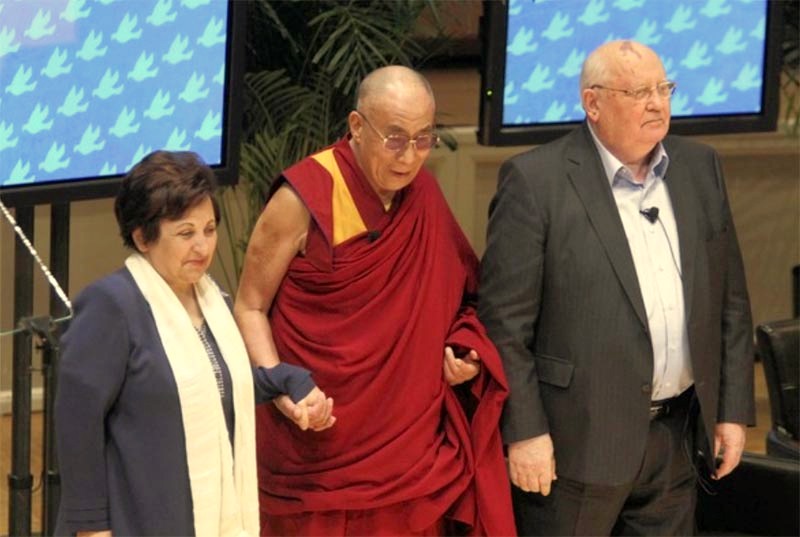 Chicago -The spiritual leader of Tibet, His Holiness the Dalai Lama, Tibet's exiled spiritual leader, said Wednesday, April 25 he would not alter his non-violent quest for greater Tibetan autonomy, even after Beijing blamed him for inciting a wave of unrest.
Chicago -The spiritual leader of Tibet, His Holiness the Dalai Lama, Tibet's exiled spiritual leader, said Wednesday, April 25 he would not alter his non-violent quest for greater Tibetan autonomy, even after Beijing blamed him for inciting a wave of unrest.
"Recently things become very, very difficult but our stand -- no change," the Dalai Lama told the World Summit of Nobel Peace Laureates.
"Independence, complete independence is unrealistic -- out of (the) question," the Dalai Lama said, saying his non-violent "Middle Way" of seeking change from Beijing still has the support of 90 percent of Tibetans. "So we can continue," he said in a press conference at the conclusion of the summit.
Tibet's leadership-in-exile in India remains committed to "meaningful talk" with the Chinese government in order to establish "meaningful autonomy" for the Tibetan minority, he said.
The latest self-immolations by a pair of young Tibetan men occurred last week in the prefecture of Aba in a rugged area of Sichuan province, overseas Tibetan rights groups said.
"Sometimes I describe totalitarian regimes as no ear, only mouth," he told the summit with a laugh. The Chinese officials "lecture us, never really listen" and are angry that "I am not acting like 'yes minister'," he said.
"Our approach failed to bring some concrete or positive result from the government, but the Chinese public, or Chinese intellectuals, or students who study in foreign countries -- they are beginning to know the reality," he said. "That, I think, is a positive side, a significant result."
The Dalai Lama also expressed the need for patience in the decades-long struggle. "Sometimes people have the impression (this is) some crisis very recently happened," he said.
"I meet some Chinese. They are frustrated. Very hostile. Then I tell them long stories... 60 years of stories. Then they understand, oh -- the Tibetan issue is really a very, very complicated issue."
Since 2009, 35 Tibetans in Tibet have set themselves on fire calling for freedom and His Holiness the Dalai Lama's return to his homeland. Atleast 25 of these self-immolators have died, and others are either critically injured or their status unknown.
Beijing has repeatedly accused His Holiness the Dalai Lama of inciting the self-immolations in a bid to split the vast Himalayan region from the rest of the nation. On April 2nd, His Holiness the Dalai Lama said recently concerned people should examine the causes of the self-immolations.
"I think this problem was not created by...Tibetan Buddhist culture," he told a Taiwanese news channel Next TV, "which is very peaceful, very compassionate... This problem was started by totalitarian, blind policy. So the people who created that policy must think seriously about these things."
Twelve Nobel laureates including South African Archbishop Desmond Tutu recently have urged China's president to resume talks with the Dalai Lama, but the Buddhist monk said that up until now, negotiations had not been productive.


![Tibet has a rich history as a sovereign nation until the 1950s when it was invaded by China. [Photo: File]](/images/stories/Pics-2024/March/Tibet-Nation-1940s.jpg#joomlaImage://local-images/stories/Pics-2024/March/Tibet-Nation-1940s.jpg?width=1489&height=878)















